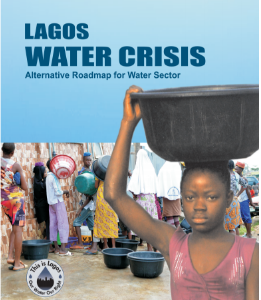For nearly two years, people in Lagos, Nigeria have been mobilizing to demand a public water system that delivers clean, safe water to all residents. Today, we’re thrilled to announce the next step in the campaign: the release of “Lagos Water Crisis: Alternative roadmap for water sector.” This book lays out a vision for how the city can solve its water crisis, with specific recommendations and action steps for the Lagos government.
The water crisis in Lagos is dire. The World Bank’s decades-long push for water privatization (including so-called “public-private partnerships”) has left the city with dry taps and many people drinking unsafe water or paying exorbitant amounts for water of unknown quality.
The growing and vibrant movement for a solution in Lagos has reached a critical turning point. Corporate Accountability International is proud to partner with Nigerian-based Environmental Rights Action (ERA) and Public Services International (PSI) and its affiliates in helping build enormous and highly visible momentum in Lagos and internationally, as represented by the powerful “Our Water, Our Right” coalition. Because of this campaign, the World Bank ended its latest push for a privatization contract in the city, and the Lagos government is looking for workable solutions. With top officials engaging on this issue, the time is ripe for a clear, fresh roadmap forward.
Members of the “Our Water, Our Right” coalition will deliver this report to decision-makers and public figures throughout Nigeria, including the Lagos Governor and members of Nigeria’s national parliament. It provides the tools decision-makers at all levels need to reject water privatization schemes and champion the human right to water. Crafting a new plan, as laid out in the report’s recommendations, will ensure a well-functioning, democratically governed water system in Lagos and beyond.
Key findings from the report include:
1. Improving public water systems is both possible and preferable.
Proponents of water privatization make enticing promises, but the industry has a poor track record of delivering on those promises. One of these promises is that of superior private sector efficiency. Numerous international studies have demonstrated that there is no evidence that the private sector is more efficient. Another promise is that the private sector will raise money more cheaply than government, but experts have found that in most cases, government borrowing is less expensive.
2. Public financing, rather than private investment, provides a better deal for the people and the government of cities like Lagos.
3. Collaboration between public providers provides better solutions than privatized, competition-based systems.
PUPs (public-public partnerships) are collaborations between two or more public authorities or organizations. Based on solidarity, they are formed to improve the capacity and effectiveness of one partner in providing public water supply and/or sanitation services. The absence of commercial considerations allows public partners to reinvest all available resources into the development of local capacity, to build a mutual trust which translates into long-term capacity gains, and to incur low transaction costs.
4. Strengthening public water systems is good for democratic governance.
5. Lagos’ water system can become a world-class model for other cities to follow.
Collaborating organizations on this report include ERA, Corporate Accountability International, Transnational Institute, Public Services International Research Unit, Public Services International, and Amalgamated Union of Public Corporations, Civil Service Technical and Recreational Services Employees (AUPCTRE). Download the full report.
We look forward to the positive developments in Lagos that this report will make possible. Stay tuned for further updates!







